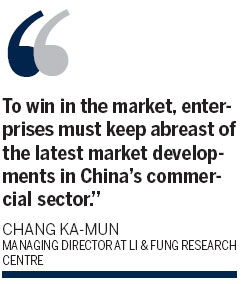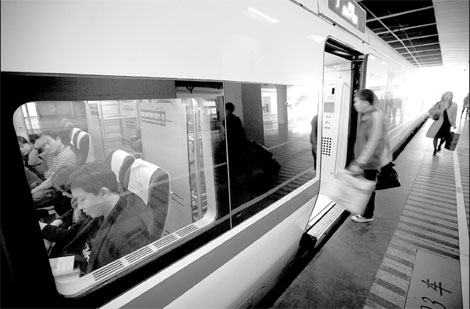Model shift to provide opportunities
Updated: 2011-01-06 07:18
By Joy Li(HK Edition)
|
|||||||||
|
Passengers board a Shenzhen to Guangzhou high-speed train. The expansion of the national railway network will change the commercial and retail landscape, a report said. Forbes Conrad / Bloomberg |
Report: Businesses should target domestic consumption in railways, online retailing
As China enters the 12th Five-Year Plan in 2011, railway network expansion and online retailing offers tremendous business opportunities for companies setting their sights on the country's domestic consumption, a report released Wednesday said.
Entitled "Ten highlights of China's commercial sector, 2010-2011", the report was put together by the Expert Committee of the China General Chamber of Commerce.
Hong Kong-based Li & Fung Research Centre, the research institute of the trading giant Li & Fung Group, participated in the research process and published the report. The views of over 160 experts nationwide were collected.
In the 12th Five-Year Plan, boosting domestic consumption will rank high on the government agenda. And with government efforts to re-orient the country's economic growth model to become more consumer-driven, China's retail and consumption market offers huge opportunities.
"To win in the market, enterprises must keep abreast of the latest market developments in China's commercial sector," said Chang Ka-mun, managing director at Li & Fung Research Centre.
Among 10 highlighted sectors, the research center singled out a few that deserve special attention.
Firstly, the expansion of the national railway network is set to transform the commercial and retail landscape, the report said. According to the Ministry of Railways, eight high-speed railway lines will be built by 2012, extending the network to 13,000 kilometers and surpassing Europe as the world's longest.
Experts involved in the report believe that large daily passenger flows, particularly at inter-change railway stations, will create new business opportunities in the stations and in surrounding areas. Meanwhile, due to their high levels of accessibility, train stations will become popular places for social activities and gatherings. The report points out that retailers should pay more attention to the inherent value of railway shops.

Chang recommended that Hong Kong retailers should take proactive steps, getting involved earlier at the planning stages. They should also seek the help of various industry associations or get the government to help with business facilitation.
Online retailing is another area that has enjoyed eye-popping growth in recent years. According to iResearch, a mainland consulting firm specializing in the Internet industry, the transaction value of China's online retailing market reached 263 billion yuan in 2009, up 105 percent year-on-year.
The report identified three major trends to watch in 2011. Firstly, more traditional retailers on the mainland tend to set up online retailing platforms to supplement their physical stores, an ever-growing "bricks-and-clicks" model.
Secondly, since logistics usually presents a challenge, online retailing platform operators have started to invest in their own logistics and fulfillment facilities. Thirdly, group purchase websites that offer heavy discounts by rallying a large number of buyers have mushroomed in recent months and will become more mature as regulation strengthens.
For Hong Kong businesses eyeing a slice of this market, Chang thinks logistics is the key and he recommended a cooperation model with successful online mall operators on the mainland or established courier companies.
China Daily
(HK Edition 01/06/2011 page3)
